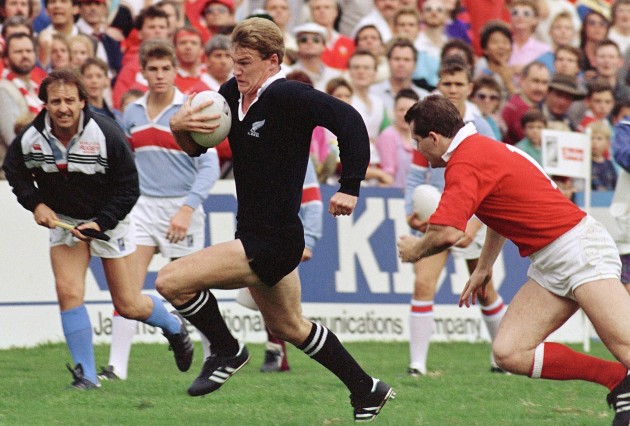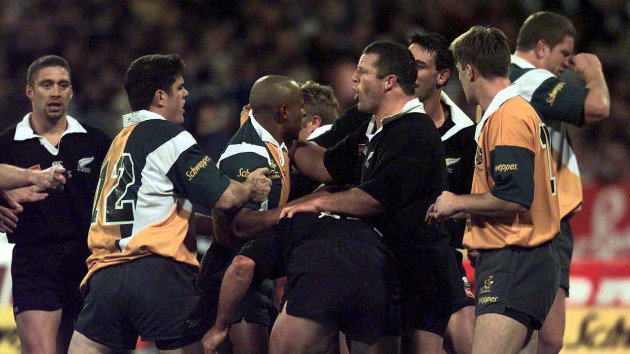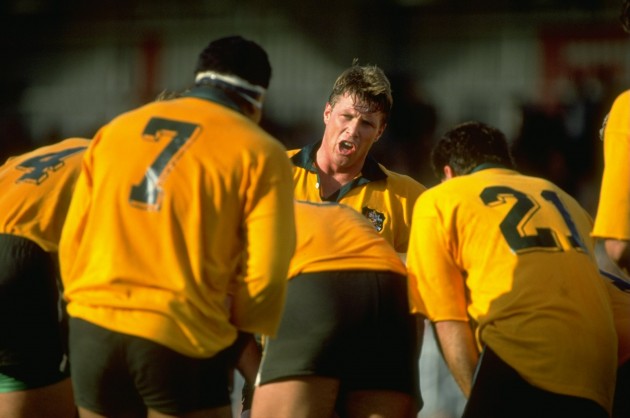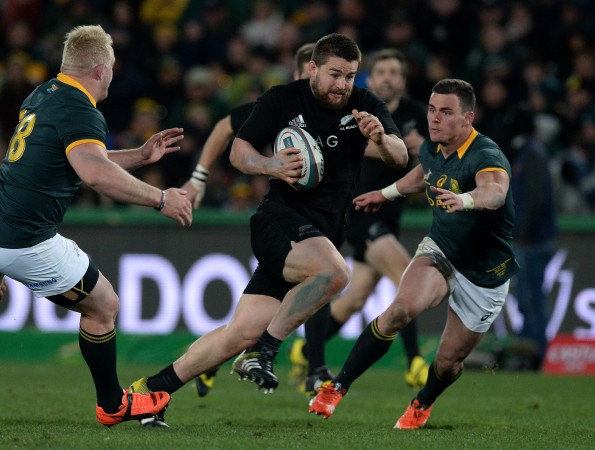Sean Fitzpatrick featured in 92 internationals for New Zealand, 24 of his Test caps coming against Australia. The former hooker was in a perfect position to tell Rugby World about the Bledisloe Cup rivalry.
Eleven years on the front line of the Test arena saw Sean Fitzpatrick captain New Zealand 51 times on the way to 92 caps. Remarkably, 24 of the former hooker’s international appearances came against Australia. Few can articulate trans-Tasman tensions from a more experienced vantage point.
This weekend, the Bledisloe Cup is contested in Sydney. Two sides unbeaten thus far in The Rugby Championship lock horns in a compelling clash that falls just 42 days out from the Rugby World Cup.
Fitzpatrick will be watching on in his role as a Sky Sports pundit, and told us about what makes this fixture so special.
Rugby World: How were you introduced to the rivalry with Australia as a kid growing up in New Zealand?
Sean Fitzpatrick: My first memory was of a guy called Greg Cornelson scoring four tries for Australia to beat the All Blacks at Eden Park.
I was about 15 or 16 then. It was probably my first appreciation of how good these Aussies could be.
RW: And can you remember your first game against Australian opposition?
SF: I played in the New Zealand Under 21 team for the curtain-raiser to Australia against the All Blacks at the Sydney Cricket Ground in 1984. That day, the Wallabies beat the All Blacks.
Before that, I’d played against Australia a couple of times in schoolboy internationals. In my year, they had Michael Lynagh, David Campese and a lot of guys who went on to play for the senior side.
We were always seen as the kids across the ditch, I suppose – the little brother.
RW: Dan Carter spoke this week about his early Bledisloe experiences. He said his senior teammates made him appreciate the magnitude of those matches. Was that the same for you?
SF: Every two years one team would tour the other country. We would play three Tests and the Bledisloe Cup would go on the line. Every other year there would just be a one-off Test.
When I started I was playing for the All Blacks there was Andy Dalton, Gary Knight, John Ashworth and Buck Shelford. John Kirwan had played a few games before I got in too. Those were players we had watched growing up as kids.
For them, it was a huge thing and that continued through onto you. Their desire rubs off on you. The rivalry continues with every new player and long may it do so.
RW: Your second cap came against Australia at Wellington and they won 13-12…
SF: We did. We lost and then we all got dropped. I remember the following Sunday sitting round the radio at my mum and dad’s – in those days the team for the next week was read out at 10 o’clock in the morning.
The announcement said: ‘For the second Test in Dunedin, there has been eight changes.’ I thought: ‘Oh God, that’s quite a lot.’ Then it continued: ‘We’ve replaced the whole forward pack.’
It wasn’t that big a setback for me because I was just happy to have played with my childhood heroes. I wasn’t even regularly playing for Auckland at that stage and I learned a lot from it anyway.
RW: So is the old cliché true? You played against Australia on 24 occasions and won 16 times, but do you take more from the losses?
SF: I think so. I look back to Wellington in 1990. We hadn’t lost for years and, believe it or not, we’d got a bit fat and lazy. We were taking our positions for granted. They beat us 21-9. That was when Phil Kearns gave me the famous two-fingered salute.
We learned a lot then, but unfortunately we didn’t learn quickly enough. We lost to them again 12 months later in the World Cup semi-final at Lansdowne Road.
RW: There must be some better memories, though…
SF: At the 1987 World Cup we respected the Australians so much that we were really happy when France beat them in the semi-final. We weren’t sure we’d beat them in the final.
Without disrespecting the French, even after we’d won the tournament there was still that hankering at the back of our minds that the Australians were actually a better team than us because they’d beaten us the year before in the Bledisloe Cup series.
We played them literally two weeks after the World Cup final at Concord Oval, Sydney in front of about a capacity crowd of 21,000 people. We beat them [30-16] and I managed to get over for two tries, so it has to be one of my happier Bledisloe Cup memories.
RW: If you could have brought over one Wallaby into your All Blacks side during your era, who would it have been?
SF: Nick Farr-Jones was outstanding in the way he captained the team and in the service he gave to his backs. He was a thorn in our side. Then there was Michael Lynagh. And David Campese, too – if you were picking a World XV, he’d always be close.
RW: Let’s move onto this weekend, then. Is it fair to say that neither team has quite hit their best yet in The Rugby Championship, despite winning both of their fixtures?
SF: Well, I think the All Blacks are looking pretty good. Obviously they’re going to improve because they’re trying things also. They still want to win trophies. They’ve held the Bledisloe since 2003 and this is the tournament decider too.
Australia can get a lot better. They’ve got a lot of talent, but whether they can get that right in 40 days or not, I don’t know. They’ve got a really difficult pool to get through at the World Cup.
RW: So what does this match mean in the context of World Cup year?
SF: This World Cup is going to be about who has the best depth. It will probably be the most difficult World Cup to win. Over The Rugby Championship we’ve seen coaches introduce youngsters to Test matches. That’s the only way you can see how a player will react.
For the All Blacks, winning at Ellis Park and exposing the likes of Lima Sopoaga to the intensity of the international arena – you can’t buy that.
RW: At hooker, your old position, Stephen Moore and Dane Coles go head-to-head. They are both key figures for their teams in different ways. How do you see that going?
SF: Stephen Moore is so important for the Wallabies. He’s no frills – he does his job really well without making too many mistakes. Real, quality leadership is something Australia have lacked over the last few years and it is something they appear to be getting back, on and off the field.
Dane Coles is raw, but for me at the moment he is probably the best hooker in world rugby. Saying that, Bismarck du Plessis has really come back into form over the last few weeks. I just think Dane offers so much.
We always knew he had the running game but there’s the rest of his game now. He’s got bigger, he sticks the scrummage really well and his lineout throwing is good. He just has that x-factor.
RW: Some critics have highlighted Dane Coles’ temperament over the past season or so.
SF: His temperament has been a weakness that he’s had to work on. We all go through that. I went through a bull-in-a-china shop phase.
Dane has got some rough edges but he’s working on that and Steve Hansen has addressed it because he could be a special player. In saying that, Keven Mealamu played one of the best Tests I’ve seen him play in years against Argentina.
RW: Same question then. If you were Steve Hansen, which one Wallaby would you bring into the All Blacks set-up?
SF: From the current team? (Long pause) You might look at Michael Hooper and David Pocock, I suppose. Other than that I don’t know. I’m not sure who else. If I’m picking a combined All Black-Wallaby team, there wouldn’t be too many Australians. Michael Lynagh might have a view on that.
RW: If you “might” bring over Hooper or Pocock, how do you think Richie McCaw will go against them this weekend?
SF: (Laughs) I think he’ll go pretty well, actually. He’s phenomenal. He’s been playing international rugby for 15 years now. And he’s still going very well.
Sky Sports’ Summer of Rugby continues with Australia vs New Zealand live on Sky Sports 3 from 10.30am BST and also includes England’s warm-up internationals.










